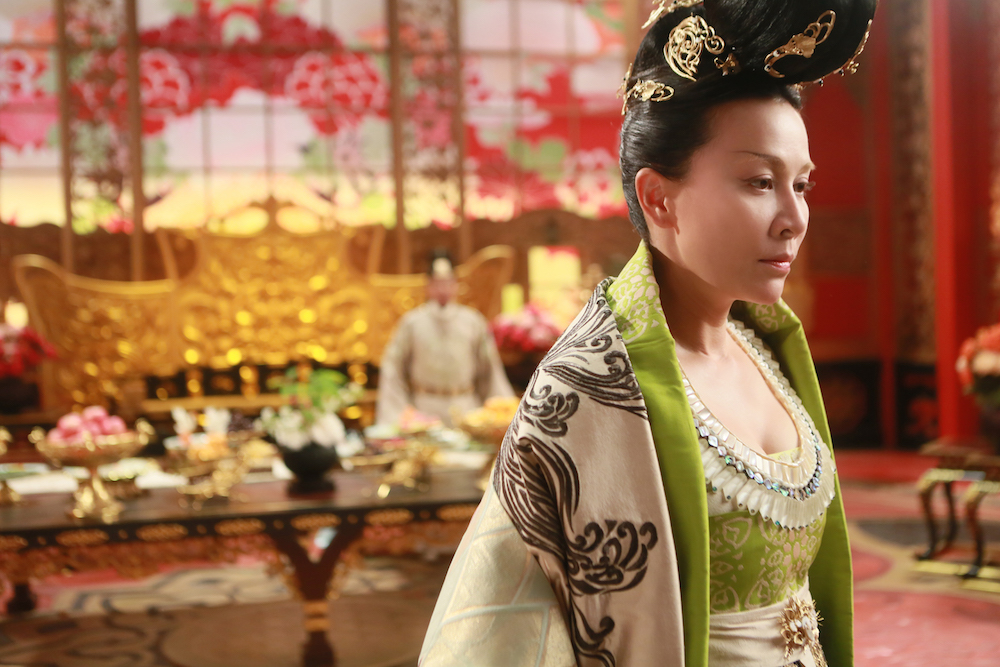Film Review: ‘Detective Dee: The Four Heavenly Kings’
By Maggie Lee
LOS ANGELES (Variety.com) – Sorcery and delusions of power are the dominant themes of “Detective Dee: The Four Heavenly Kings,” the third and most spectacular of the Chinese franchise about a real-life sleuth of the Tang dynasty. This time the hero uncovers a court conspiracy in which conjurers of illusions play a deadly role, a pretext for director Tsui Hark to run amok with visual effects while slipping in his usual political innuendoes about Machiavellianism and mind-control. On the level of pure popcorn entertainment, there’s not a thing one can fault the 3D megabuster for, and it should steamroll other domestic competition in the summer domestic market while satisfying Tsui’s longtime followers.
At 68, the Hong Kong genre maestro’s childlike imagination and technical inventiveness seems inexhaustible. The script, co-written by Tsui with Chang Chialu, who also teamed up for the last two chapters of the franchise (“: Mystery of the Phantom Flame” and “Young Detective Dee: Rise of the Sea Dragon”) provide relatively smooth exposition for a storyline packed with characters, action and backstory, though the mysteries, and Dee’s methods of deduction are less brain-teasing than before.
In “Rise of the Sea Dragon,” Di Renjie (Mark Chao) — or Dee for short — came to the Tang capital of Luoyang to join the Dalisi, or Bureau of Investigations. With the grudging support of his partner/rival Yuchi Zhenjin (Feng Shaofeng, “Wolf Totem”), they thwarted a conspiracy by the Dondoers, an island tribe that tried to enfeeble the ruling class to conquer Tang. Now, as reward, the Emperor Gaozong bestows on Dee the Dragon-taming Mace, which empowers him to subdue anyone threatening national security, even royalty.
The mace’s symbolic power irks Empress Wu, and she orders Yuchi, now promoted to Commander of Golden Guards, to confiscate it. Distrustful of Yuchi, Wu sends a gang of sorcerers called the Mystic Clan to “assist” Yuchi on his mission. Not surprisingly, despite a treacherous ruse, both sides fail miserably to outwit Dee, who has made ingenious plans to hide the weapon. This provides occasions for elaborate strategic setpieces and fights utilizing dazzling weaponry, such as giant scimitars that slice the air like sharpened frisbees and Ninja darts that explode like thunderballs.
As it happens, the Mystic Clan turns out to be mere opportunists wanting to curry favor with the court, whereas the more serious threat comes from an Indian sect, which earned the title “Wind Warriors” from the first Tang emperor when the group helped him found the empire. Here, Tsui demonstrates unbiased historical insight in his vision of Tang as a Golden Age of ethnic and cultural diversity, but also a state of corruption and ruthless expansionism. Just as the Dondoers schemed against the Tang court because their survival was threatened, the Wind Warriors also nurse harsh grievances against the Imperial family. However, the real menace to the country’s stability actually springs from Empress Wu’s over-arching ambition.
Corresponding with fire and water as motifs in the previous two installments, Tsui features air as the key element here. Not only are Dee’s adversaries named Wind Warriors, but most of the action takes place at high altitude, from a daredevil rope climbing stunt to magical illusions that materialize from nothing and vanish into thin air, notably a carved dragon that comes alive and swoops around before soaring into the sky. Action director Lin Feng devises wire-fu that surpasses the last film in its intricate choreography, while editing by Li Lin and Tsui himself drives the plot with the speed of a hurricane. The final showdown is a high-end technical feat (achieved with top Korean and Japanese VFX studios) and B-movie cheekiness, mashing up “King Kong” with “Sinbad the Sailor.”
Though billed in a supporting role, Carina Lau’s Empress Wu actually steps up to the fore as she engulfs the capital in her own thirst for power. Her encounters with the Faceless Lord, a phantom figure who recalls Alexandre Dumas’ “The Man in the Iron Mask” serve as creepy illustrations of both the addictive allure of power and the chilling sacrifices required to reign. As if telegraphing her inner ogre, Wu’s coiffure becomes more monstrous with each scene.
While character chemistry between the three male leads remains sparky, attention has shifted to Dr. Shatuo Zhong (Lin Gengxin, “The Taking of Tiger Mountain”), Dee’s Watson-like sidekick. His budding romance with sorceress Water Moon (Ma Sichun, “Soul Mates”) is standard frenemy stuff, and their shared Toquz-Oyuz (Turkic) ethnic identity comes out of nowhere. Nevertheless, Tsui’s fondness for feisty, independent heroines hasn’t waned, even though it’s never explained why a nice girl like her would fall in with the shady Mystic Clan.
Feng again maintains the most charismatic aura as Yuchi, subtly embodying his transformation from a vain, officious enforcer to a swashbuckling hero and loyal friend to Dee — though the script could have made more of his moral dilemma when torn between obeying the Empress’ orders and having Dee’s back.
That leaves Dee as the least engaging character this time round, reduced mostly to a crime-solving agent. A subplot involving his relationship with the monk Tripaka and his disciple Yuan Ce (“Monga” thesp Ethan Yuan, looking saintly in bald hair) is not not developed beyond functional purposes. And without convincing emotional context, Dee’s illness, “caused by inner demons” doesn’t hold water.
While production values boast anything money can buy, signs of bloated aesthetics abound — think of it as a kind of cinematic megalomania. Production designer Yoshihito’s Akatsuka’s palace interiors are encrusted with so much crimson and gold that it’s gaudiness galore. The stormy score by Kenji Kawai adds a deafening roar. Costumes and image design by Lee Pik-kwan and Bruce Yu are creatively influenced by Korean shamanism and Japanese stagecraft, but sometimes seem so grotesque they verge into Terry Gilliam territory, overwhelming the frame.

